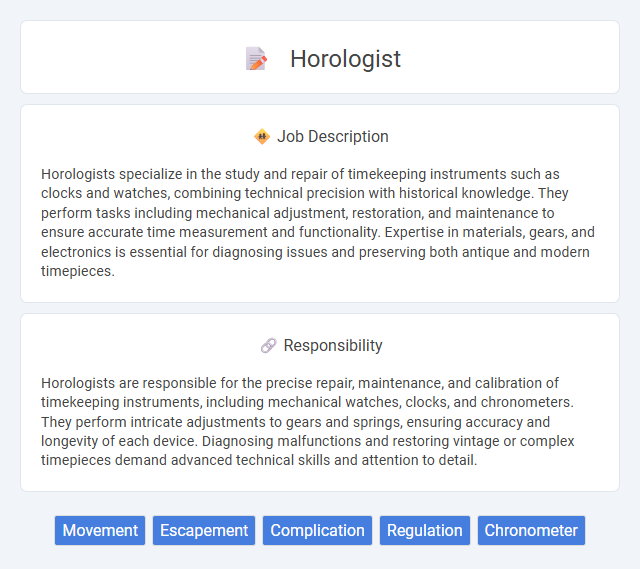
Horologists specialize in the study and repair of timekeeping instruments such as clocks and watches, combining technical precision with historical knowledge. They perform tasks including mechanical adjustment, restoration, and maintenance to ensure accurate time measurement and functionality. Expertise in materials, gears, and electronics is essential for diagnosing issues and preserving both antique and modern timepieces.
Individuals with strong attention to detail and patience are likely suitable for a horologist role, as the job demands precision and careful handling of intricate mechanisms. People who enjoy working with their hands and have a penchant for problem-solving may find this profession fulfilling. Those prone to frustration or lacking fine motor skills might face challenges in excelling as a horologist.
Qualification
Horologists require expertise in mechanical and electronic timekeeping devices, often necessitating a certification from a recognized horology institute. Proficiency in precision repair, restoration, and maintenance of clocks and watches is essential, complemented by strong manual dexterity and attention to detail. Formal education typically includes coursework in micro-mechanics and micro-electronics, while advanced knowledge of historical timepieces enhances job prospects.
Responsibility
Horologists are responsible for the precise repair, maintenance, and calibration of timekeeping instruments, including mechanical watches, clocks, and chronometers. They perform intricate adjustments to gears and springs, ensuring accuracy and longevity of each device. Diagnosing malfunctions and restoring vintage or complex timepieces demand advanced technical skills and attention to detail.
Benefit
Working as a horologist probably offers benefits such as honing precision skills and deepening knowledge of mechanical timepieces. This profession likely provides opportunities for creative problem-solving and continual learning in both traditional and modern watchmaking techniques. It may also offer the satisfaction of restoring valuable antiques and contributing to the preservation of horological heritage.
Challenge
The horologist profession likely involves solving intricate mechanical problems and working with delicate, miniature components demanding high precision. There is a strong probability that mastering various timekeeping mechanisms requires continuous learning and adaptation to new technologies. The challenge may also stem from balancing traditional craftsmanship with modern innovations to maintain accuracy and reliability in timepieces.
Career Advancement
Horologists specialize in the intricate craft of designing, repairing, and maintaining timepieces, with career advancement often marked by mastering complex mechanical systems and digital technologies in modern watches. Professionals can progress from entry-level technician roles to senior positions such as master watchmaker, quality control supervisor, or horology instructor, often requiring certifications from recognized institutions like the American Watchmakers-Clockmakers Institute (AWCI). Continuous skill development in micro-mechanics and luxury brand expertise enhances opportunities in high-end retail, restoration, and bespoke watchmaking sectors.
Key Terms
Movement
Horologists specialize in the intricate study and repair of watch movements, including mechanical, automatic, and quartz calibers. They meticulously calibrate gears, escapements, and balance wheels to ensure precise timekeeping and optimal performance. Mastery in diagnosing movement malfunctions and restoring component integrity is essential for maintaining the functionality and longevity of timepieces.
Escapement
Horologists specializing in escapements meticulously design and repair the mechanism controlling the release of energy in timepieces, ensuring precise movement regulation. Mastery of escapement components such as the anchor, escape wheel, and pallet fork is critical for maintaining accuracy in mechanical watches and clocks. Expertise in adjusting escapement dynamics directly impacts the chronometric performance and longevity of horological devices.
Complication
A horologist specializing in complications focuses on designing and repairing advanced mechanical watch functions such as tourbillons, perpetual calendars, and minute repeaters. Mastery of intricate gear mechanisms and precise adjustments is essential to ensure the accurate performance of these high-complexity timepieces. Expertise in complication engineering enhances a watch's value and demonstrates superior craftsmanship within the horology industry.
Regulation
Horologists must adhere to precise regulatory standards that govern the repair, maintenance, and certification of timepieces, ensuring accuracy and authenticity. Compliance with international standards such as ISO 3159 for chronometers is essential to maintain industry credibility and consumer trust. Licensing requirements and continuous education are enforced in many regions to uphold the craftsmanship and safety protocols within the horology profession.
Chronometer
Horologists specializing in chronometers expertly design, assemble, and maintain high-precision timekeeping instruments used for marine navigation and scientific research. Their work ensures the accuracy and reliability of chronometers, which are critical for determining longitude at sea. Advanced knowledge of mechanical movements, calibration techniques, and regulatory standards is essential for maintaining chronometer performance.
 kuljobs.com
kuljobs.com